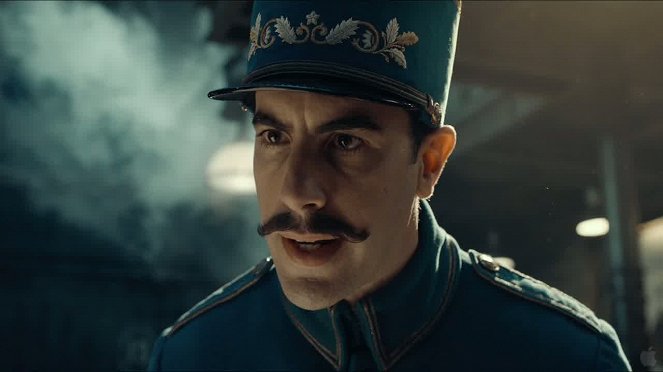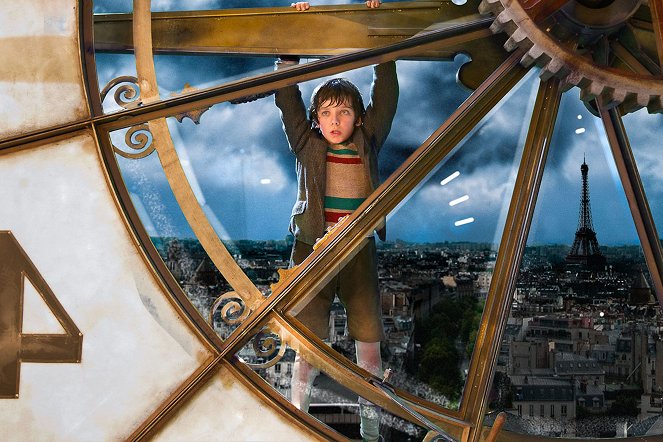Directed by:
Martin ScorseseScreenplay:
John LoganCinematography:
Robert RichardsonComposer:
Howard ShoreCast:
Ben Kingsley, Sacha Baron Cohen, Asa Butterfield, Chloë Grace Moretz, Ray Winstone, Emily Mortimer, Christopher Lee, Helen McCrory, Michael Stuhlbarg (more)VOD (2)
Plots(1)
Throughout his extraordinary career, Academy Award-wining director Martin Scorsese has brought his unique vision and dazzling gifts to life in a series of unforgettable films. This time the legendary storyteller invites you to join him on a thrilling journey to a magical world with his first-ever 3-D film, based on Brian Selznick's award-winning, imaginative New York Times best-seller, The Invention of Hugo Cabret. Hugo is the astonishing adventure of a wily and resourceful boy whose quest to unlock a secret left to him by his father will transform Hugo and all those around him, and reveal a safe and loving place he can call home. (official distributor synopsis)
(more)Videos (16)
Reviews (12)
The original book has turned into an unoriginal film in which every added thing is just excessive. A lot of scenes seem to have been made just for the vaunted 3D (especially the completely unnecessary train accident), the story is strangely sloppy, too set-up, and Sacha Baron Cohen makes too big a fool of himself... Yes, the direction is skillful, the love for Hugo films is also very nice, but I certainly didn't see anything groundbreaking. Which is quite a shame. I don't tend to do that, but this time I really want to scream: Read the book, it's so much better!
()
Some dreams do come true. The magic of film intertwined with reality, sketches with meticulously crafted images fly through the air, and Martin Scorsese pays homage to the beginnings of cinematography without getting overly sentimental or desperately trying to make the movie into a classic. Hugo seems like a sophisticated fairy tale about a boy and his great adventure, only to ultimately transform into a fascinating journey through human imagination and determination. And that nostalgic hurricane of memories of children's books and movies, as well as fascination with unreachable worlds, has a power that managed to captivate me completely.
()
He got me! I am usually coldly dismissive toward attempts to move me with a pitiful orphan or a feeble old man and often openly mock them, but here my eyes were teary and I was genuinely touched. That makes it even more disappointing to state that it is probably a suicidal film that will be a big flop at the box office and could only be partially saved by a few Oscars and the associated publicity. Because, contrary to the claims of many, it is not a typical family film, but rather an arthouse film that is suitable for projection at festivals and in film clubs. While Cameron used 3D technology to shoot a spectacular fairy tale, Scorsese used it to create a nostalgic tribute, not only to cinema, but to art in general, be it visual or literary, and to his enthusiastic admirers. It is also a homage to the technique and science that fulfills the legacy of the classic and the founder of the sci-fi genre, Jules Verne, who died a quarter century before Scorsese's story takes place, but still, it seems as if the script and characters came from his pen. Actually, it seems to me that after Zeman's film Invention for Destruction, this film is the best portrayal of Verne's world of values. All the amazing gears, complex machines, smoking locomotives and inventions, and the whole ingeniously constructed atmosphere are exactly what fits into Verne's works. Thanks to a generous budget and the enthusiasm of the actors involved, as well as Scorsese's long-standing directorial experience, an outstanding film was created that, in my opinion, will be remembered in film history. While watching it, you will recall several specific scenes from famous films of the past, without Hugo cheaply plagiarizing them. Ben Kingsley will not be associated with the character of Gandhi for me, as he is with others, but rather with the character of Méliès, and Chloë Grace Moretz gave an incredible performance for her age. Her character is charming, and that girl simply has charisma. Overall impression: 100%.
()
A movie about movies for people who like movies. Nothing earth-shattering in terms of story, but Marty reminds me of Méliès himself in terms of technical implementation and eye for detail. The same applies to the old captivating images hidden throughout the picture. Movies used to be a way of creating dreams, while today the audience wants to see reality. And isn’t there enough room for both?
()
More than just a tribute to the forefather of cinematic brats (weaned and further nourished on the sci-fi, fantasy and horror genres). The web of references to films and filmmakers who were influenced by Meliés and who possibly influenced Scorsese (who came to Meliés through his own spiritual father, Michael Powell) has multiple layers and one viewing is not nearly enough to disentangle them, while the revealing of the central idea, which is underpinned by numerous allusions, is no less entertaining. Film as a mechanical means of reviving memories, bringing people together and creating dreams. Here, only cinematic dreams, not real ones, which have the form of nightmares, serve as a reliable means of escape from reality (we therefore also mainly see examples from Meliés’s special-effects films and less from his reconstructed events). (In the second bad dream, there is a peculiar absence of clocks, i.e. time as a dimension, which mechanical inventions other than film lack). ___ The story isn’t divided into two parts; from the beginning, it’s about repairing a broken machine, with the first part accenting the mechanical level and the second part placing emphasis on the human level. We mainly see the machines first. They are placed in the foreground of the mis-en-scéne and, at the same time, Hugo pins all of his hopes on them. The first part also comes closer to grotesque films, as a human functions as an inanimate, mechanical object. The second part, from the activation of the automaton, is a partial negation of the modernistic enthusiasm over technological progress. Hugo starts to realise that the machines will not change anything about his loneliness. The guard’s mechanical leg, previously used as a source of gags, becomes a means of becoming close to the flower girl, who lost her brother at Verdun (mass slaughter thanks to the use of modern technology). The settings of the action are expanded with the addition of Meliés’s household and library. Books and people get more space. Technology is talked (theorised) about more than it is shown. ___ The mechanical thesis and the human antithesis logically lead to cinematic synthesis, to the joining of reason and emotion as, for example, Jean Epstein wrote about it (La Lyrosophie). The conclusion brings separate “peephole” scenes (gags) like those from early films into the overall narrative. Like the characters, these scenes find their place, their meaning. The film is constructed in such a way that it can result in a film. I cannot imagine a more wonderful tribute to the very idea of moving pictures. ___ The historical inaccuracies that Scorsese allows are easier to criticise than the outwardly atypical plot structure. Viewers’ dodging of the oncoming train can still be tolerated when reading the book by Tabard, who, as it happens, was not accurate in writing about Meliés, but not in Meliés’s own memoirs, which corrected other authorial errors. Meliés did not come across cinema by accident, as he was personally invited to a public film screening by the Lumière brothers and he did not create the camera from nothing, but improved an existing model by R.W. Paul. The decline in interest in his work did not come until the First World War. By about 1909, Meliés’s laborious method had made it simply impossible for him to shoot as quickly as the times demanded and he completed his final film in 1913. However, these details are overshadowed by his incredibly precise revival of old Paris and even older films (several seconds of Le Royaume des fées are memorable). The transfer into 3D gave these a new dimension without diminishing their charm. They are improved, though indirectly, by highlighting their meaning. Scorsese not only proclaims his love for film, but also calls on us not to forget. 90%
()
(less)
(more)



Ads